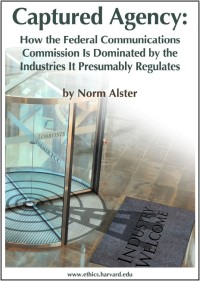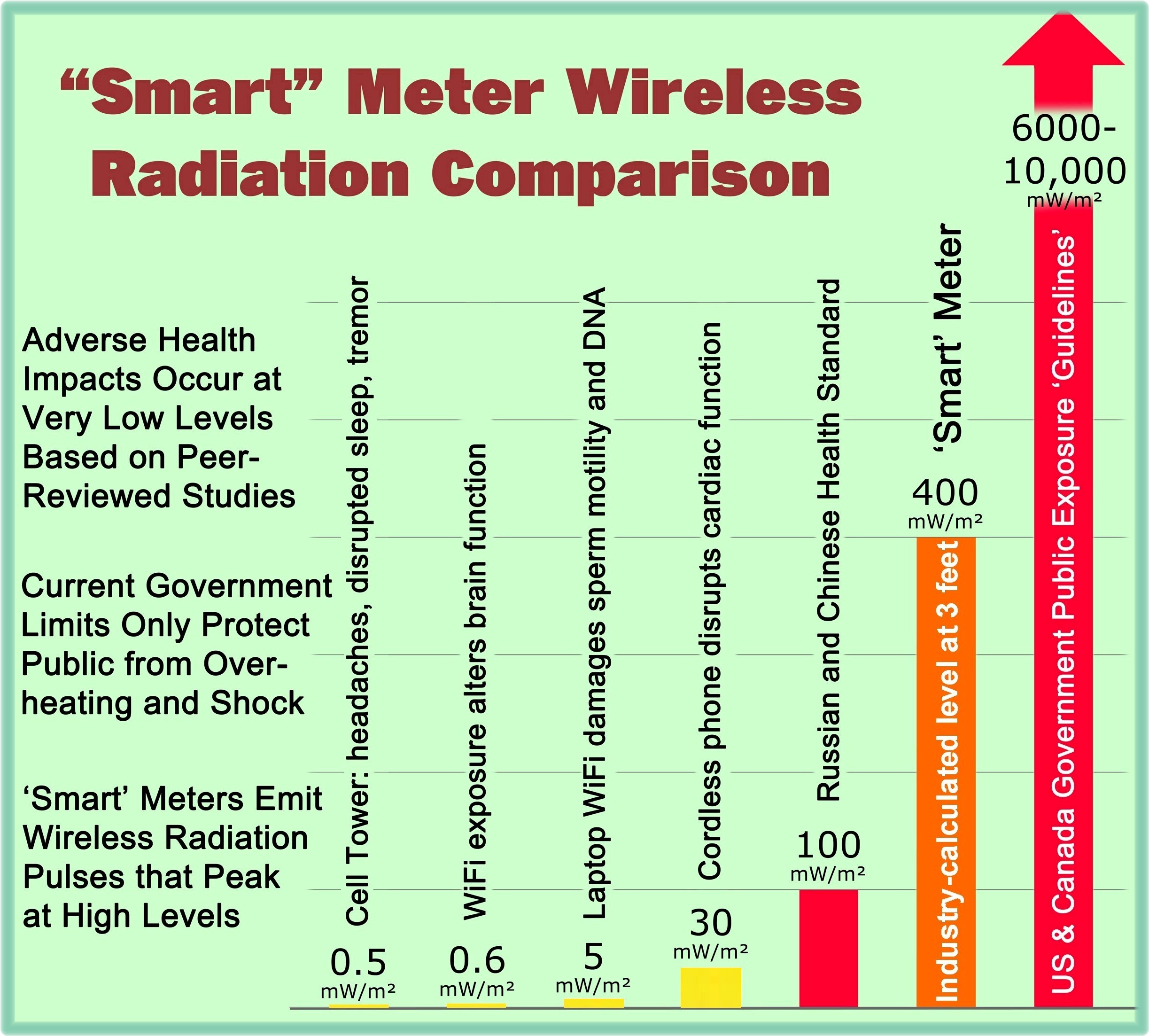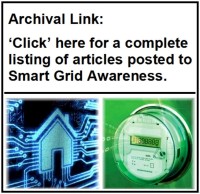by K.T. Weaver, SkyVision Solutions
 On July 7th, 2015, a Federal Judge denied an unreasonable search and invasion of privacy claim in the case of Naperville Smart Meter Awareness (NSMA) v. City of Naperville, thereby condoning Fourth Amendment violations of the U. S. Constitution.
On July 7th, 2015, a Federal Judge denied an unreasonable search and invasion of privacy claim in the case of Naperville Smart Meter Awareness (NSMA) v. City of Naperville, thereby condoning Fourth Amendment violations of the U. S. Constitution.
Since 2011, the NSMA group has been attempting to get injunctive relief from the mandatory installation of digital electric smart meters that collect granular energy usage data well in excess of that required for customer billing purposes.
Judge John Z. Lee, a 2011 appointee of the Obama administration, ruled last September that “Data from the City’s smart meters shows only total usage and no further details than that.” Since this perspective is factually incorrect, the NSMA group significantly enhanced its allegations in an amended complaint filed in December in attempt to better inform the Judge on the invasive nature of smart meters and their effect on privacy.
The latest filing by the NSMA group explained that smart meter data can be analyzed to reveal intimate details about what goes on inside a home by two principal mechanisms, specifically:
- Intuitive observation; and
- Disaggregation algorithms.
Intuitive observation is not speculation; rather, it represents reasonable inference based upon a review of load profile information where patterns are identified related to the level of power consumption, its intermittency, and its duration. Based upon intuitive observation, a data analyst can determine with high confidence a family’s sleeping and eating routines, and when a home is vacant and vulnerable to burglary. Refer to the figure below as to how “intuitive observation” is effective in revealing behavioral activities within the home.
In addition, “energy disaggregation” software is now commercially available which allows for the breakdown of smart meter granular data into appliance-level itemized consumption. By analyzing smart meter granular data through use of disaggregation algorithms, an analyst can determine specific appliance types used in the home as well as charging data for plug-in vehicles that can further be used to identify travel routines and history.
As summarized in the latest complaint submitted by the NSMA group:
“Increased granularity of Interval Data provides more than ample detail for determining home occupancy, personal behaviors, and appliance usage with different levels of confidence. Hourly data can be used to determine occupancy and major appliance categories. Minute-by-minute data can be used to determine up to 10 different appliance loads such as refrigerator, air conditioning, heater, pool pump, dishwasher, clothes washer, microwave, dryer, etc.”
So one would think that the above information as well as other supporting details submitted in the Court filing last December would have persuaded the Judge as to the impermissible privacy invasions that were occurring due to smart meter installations. Well, to some extent it did in that the Judge now acknowledged that “smart meters are capable of capturing discrete details of behavior.”
However, Judge Lee in his latest ruling yesterday, effectively and inexplicably, moved the goalpost for the NSMA group in terms of what needed to be proven. The Judge ruled that:
“NSMA still has not alleged that the City is actually collecting and using the data in a way that would amount to an unreasonable search or invasion of privacy.” [italics emphasis as used by Judge]
Note the new distinction. NSMA must not only prove that the City collects smart meter data that can be used to invade privacy, it must also prove the City is actually “using the data” for the specific intent to invade privacy. The Judge’s astonishing perspective is made even clearer when he concludes:
“Because NSMA has failed to allege that smart meters are relaying detailed information beyond aggregate data about members’ electricity usage to the City and that the City is disaggregating the data to analyze the private lives of its residents, there is no cognizable claim upon which relief can be granted.” [emphasis added]
Based upon the above ruling, it is now acknowledged that smart meters are capable of capturing discrete details of behavior and that granular data can be disaggregated to analyze the private lives of residents. However, unless you can prove that the City (or utility) is actually using the smart meter data to analyze its residents’ behavior, there is supposedly no basis for an invasion of privacy claim.
To demonstrate the absurdity of this ruling, let me first propose an analogy. I propose that the Judge’s perspective is no different than if a camera were permanently mounted inside your home recording personal activities. This camera would transmit digital images to the utility company not required for any legitimate business purpose. According to the Judge’s logic, there is no invasion of privacy claim unless you can prove that utility company personnel actually review and analyze the images that are stored within its computer systems, either now or at sometime in the future. Does that sound “reasonable” or legal?
Another analogy would be our very own applicable Fourth Amendment where there shall be no unreasonable searches or seizures of paper and effects (information) from within the home. According to the Judge’s ruling, the City of Naperville, in this instance, can seize your personal information as long as you cannot prove they review that information to analyze your behavior in the home. They get to seize and retain your personal information forever as long as they do not use or you cannot prove it was used to discern your personal activities.
From my perspective, I feel spied upon as soon as the camera takes the pictures within my home without my permission, to use the analogy. Don’t you? Plus, think of the potential areas of abuse whether it be through later subpoena of records by other governmental authorities or by hacking or through the actions of disgruntled, rogue, or unstable utility employees or contractors, etc., at any time in the future. The risks are tremendous, but according to this Judge, there is no problem.
The Judge in this case failed to realize or accept that a loss in privacy and associated harm occurs at the time that the granular smart meter data is unnecessarily collected. The injury increases if the City, utility, or other party later misuses the data once collected but that does not negate the initial injury that occurs at the time of collection.
In addition, and at a more basic level, the Judge in this case remained constrained by his original case law references leading him to illogically conclude that:
“NSMA members have no reasonable expectation of privacy under the Fourth Amendment in the aggregate measurements of their electrical usage — regardless of whether that aggregate usage is measured monthly, weekly, daily, hourly, or in fifteen-minute increments.”
Upon inspection, the above logic is compelling when “[t]he power records, unlike telephone or bank records, do not reveal discrete information…” as outlined in State v. Kluss, 867 P.2d at 252-54 (Idaho Ct. App. 1993). Such is the case for traditional analog meter technology which by definition only displays aggregate or cumulative data and where such meter values are typically recorded by the utility on a once per month basis. However, it is not the case for City of Naperville smart meters which collect Interval Data quite frequently and therefore as stated by Judge Lee himself “that smart meters are capable of capturing discrete details of behavior.”
I hope you recognize and appreciate the difference (and irony) on how the word discrete is used in the two different legal cases, i.e., do NOT reveal discrete information versus capturing discrete details.
The Judge’s own realization that smart meters can capture “discrete details of behavior” invalidates the applicability of his original case law references and, to me, rendered his final opinion and order as nonsensical.
Although this Court ruling is considered a setback for personal freedom and the rule of law, utility companies should still take heed that even in this Court, intentional and provable mining of smart meter data to reveal personal behavior patterns would be cause for a “legitimate” invasion of privacy claim.
At this juncture I do not know whether the NSMA group plans to appeal the Judge’s latest decision. But more people need to speak up and take action on the invasion of privacy issues before our freedom is lost.
Among other technologies, the smart meter puts us all under constant surveillance, and I will close by asking you to listen to the 1 ½ minute video featuring Bruce Schneier who has authored a book called “Data and Goliath: The Hidden Battles to Collect Your Data and Control Your World.” As he states, we must resist this “big data land grab” or else be stripped of our freedom. So far, the Courts are not protecting us.
Related Articles on Privacy at this Website
- Privacy is a ‘Cause for Concern’ with Smart Meters
- Consumer Organizations’ Grave Concerns on Smart Meters Ignored
- Fort Collins, Colorado Provides Consumer Choice on Smart Meter Privacy Invasions
- How Smart Water Meters Invade Privacy
- Smart Meter Privacy Invasions Are Not Justified in a Democratic Society
- Naperville Smart Meter Lawsuit Due Back in Federal Court
Primary Source Material for this Article
Naperville 11-cv-9299 Memorandum Opinion Order 7 7 2015






For a judge to get something SO wrong, deciding the exact OPPOSITE of the obvious, can only mean:
1. From his job history, he’s a brainwashed “corporate group-think” delusional libtard (worked for a Fed agency & then big law firms, the last & longest being in Commie-land Chicago).
–Independent solo-practitioners are less likely to suffer from “group-think.”
2. He’s too young, only 47, born after the USA already went cuckoo beginning in 1963, so you could say he was born “mentally handicapped.” 😉
3. He was born in Germany but I couldn’t find when did he ever become a US Citizen? Maybe he’s a “Nazi at heart.” (Or were his parents USA Citizens living in &/or stationed in Germany?)
4. He went to Harvard & is a possible member of the “Good Old Boys Club” (Freemasonry) as many “professionals” are (doctors, dentists, lawyers, judges, police, etc.) & follows their agenda. It’s how they “climb the ladder” (via Masonic connections > “fringe benefits”). Start asking all your favorite professionals at future appts./interactions. You’d be surprised.
Either way, good write-up re the case. Thanks.